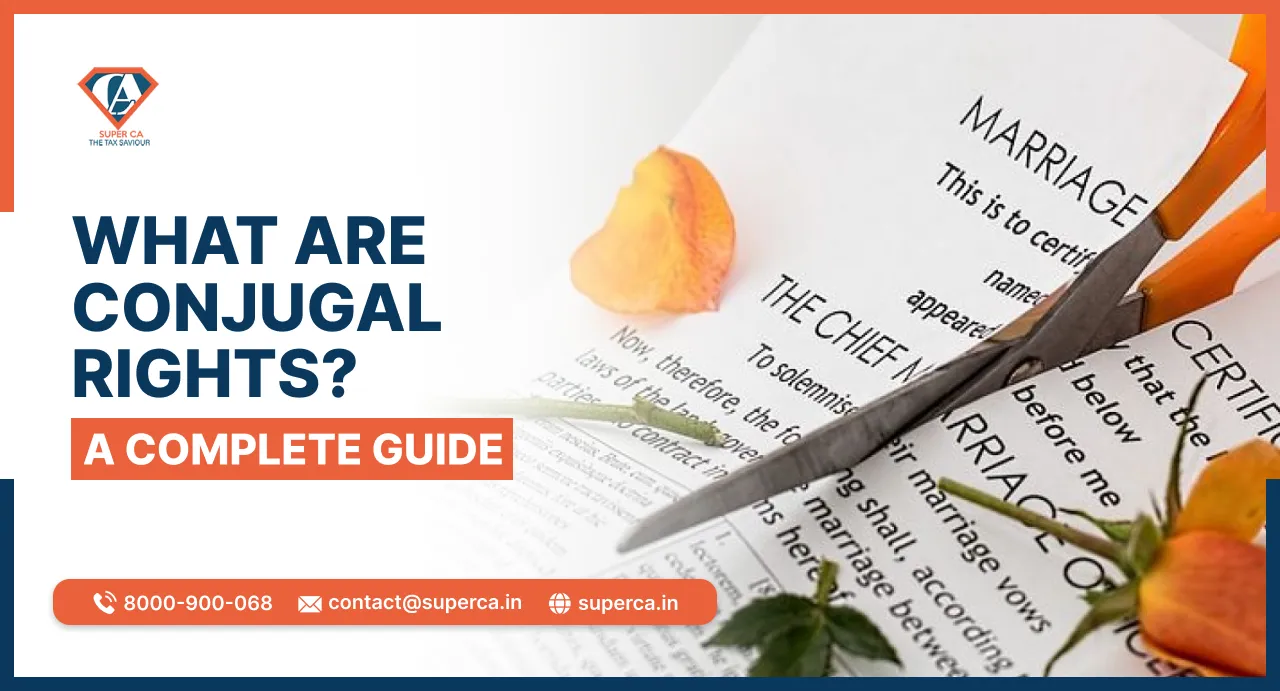What are Conjugal Rights? A Complete Guide
- Posted By SuperCA
- On 27 June

According to the Oxford Dictionary, the word “conjugal” means “related to marriage or a relationship shared between a married couple.” Various provisions to restore the conjugal rights occur when either the husband or the wife pulls out from the society of the other person with no sufficient cause for it. We can simply say that conjugal rights are the entitlement of an individual to stay with their spouse. This right can be used by the aggrieved individual (either husband or wife) after issuing a petition in the district court and pleading for the restoration of conjugal rights. Once the court has validated the statements that have been mentioned in the petition, the court can choose to order the restitution of the individual’s conjugal rights. In this blog, we will go through a detailed description of the concept of conjugal rights.
Eligibility Criteria
If an individual wishes to file a petition for the restoration of his/her conjugal rights, then he can do so only based on the conditions listed below:
- The marriage should be valid
- The couple should not be living with each other
- The withdrawal of the other party does not have a sufficient cause
- The petitioner holds a bonafide desire to stay with the spouse
Rejecting Grounds For Petition
The petition filed for the restoration of conjugal rights may be rejected on the basis of the following conditions:
- In case the respondent is qualified for some matrimonial relief
- In case the petitioner confesses of a matrimonial misconduct
- In case the petitioner’s actions are not good for a marital relationship
- In case the couple has to live separately for employment purposes
Divorce Vs. Conjugal Rights
The intermixing of a petition for a divorce and for the restoration of conjugal rights is still debatable. Some of the judicial authorities believe that it is possible to support a petition for conjugal rights with an alternate prayer for divorce whereas some feel that petitions related to divorce and conjugal rights are contrasting in nature and therefore can not be made together. Also, according to the general consensus, both the petitions are reciprocally destructive of each other as both go in contrast. Conjugal rights are like an opportunity to live with one’s spouse again whereas the divorce laws are in sharp contrast.
Judicial Separation
It is possible to seek judicial separation by either of the individuals in case they do not want to choose divorce as an option. Under this provision, both the parties are separated from each other without dissolving the lawfulness of their marriage. It also allows the defence to file for a petition of restitution of conjugal rights. According to the Hindu Marriage Act, judicial separation is enabled in order to prevent any sort of abrupt cases of divorce. In case the respective parties have continued the separation for a time period of one year or more, then the parties qualify to file for a divorce. Some of the valid conditions to enact the provision of judicial separation are given below:
- Any sort of adultery towards the partner
- Any sort of cruelty towards the partner
- Any instance of deserting of the partner
- Any attempt to convert the religion of the partner
- If any of the parties suffers from leprosy
- If any of the parties suffers from a communicable venereal disease
- Any sort of insanity of the partner
- If the partner is absent for seven years
- Attempt of rape, sodomy or bestiality by the male partner
- If the marriage of the couple is premature
- The male partner wishes to remarriage
Rights to claim maintenance
Under Section 25 of the Hindu Marriage Act, the wife has the right to claim maintenance. This maintenance can be applied to judicial separation. In case the husband is unable to meet the specified obligations, then the court may go for the properties held by the husband.





